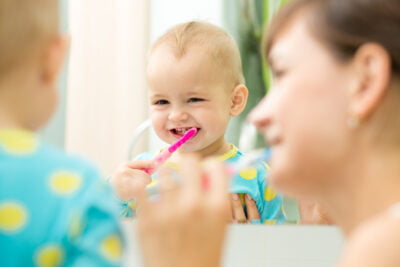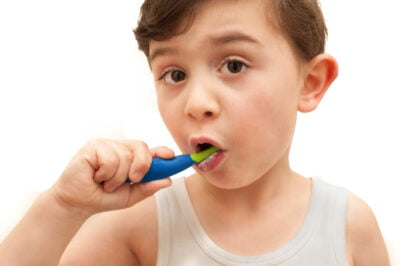 By teaching your children good oral hygiene, you give a valuable gift that will last a lifetime. It all starts with you — set a good example of regular brushing and flossing and your children will naturally follow. Additionally, brushing along with your child (maybe to music), providing a toothbrush and toothpaste with animal or cartoon characters, and anything else you can do to make taking care of teeth fun encourages them to care about their teeth from an early age.
By teaching your children good oral hygiene, you give a valuable gift that will last a lifetime. It all starts with you — set a good example of regular brushing and flossing and your children will naturally follow. Additionally, brushing along with your child (maybe to music), providing a toothbrush and toothpaste with animal or cartoon characters, and anything else you can do to make taking care of teeth fun encourages them to care about their teeth from an early age.
It’s important to realize that good oral care is especially important in the formative years. Without it, your children are at major risk for tooth decay and even tooth loss. This often results in physical pain, difficulties eating and speaking, and the need for special treatment – all of which can hinder your child’s natural development.
So when and how should you begin teaching your child about good oral hygiene? It starts right at the beginning.
Baby Dental Care
You might be surprised to learn that even babies can develop a form of tooth decay. Childhood caries can occur when a baby goes to sleep with a bottle filled with anything other than water. Sugars in milk (including breast milk), formula and juice feed bacteria in the mouth. In turn, this bacteria produces acid that attacks the hard enamel on the teeth. Try using a pacifier for bedtime soothing instead of the breast or bottle. By the age of three, however, children should be gently discouraged from sucking their thumb or a pacifier in order to prevent orthodontic problems from developing.
You can actually begin cavity prevention even before the first teeth appear. Use a damp washcloth to wipe a baby’s gums after feeding on the breast or bottle, in order to help prevent the buildup of bacteria. Once the first baby teeth emerge, brush using a small, soft-bristled toothbrush with a thin smear of fluoride toothpaste – at least once a day at bedtime.
Your child should have his or her first dental appointment by the age of one. At the Yuba City Dentistry Group, we’re happy to show you proper brushing technique. We’ll also examine your toddler for signs of early decay and determine if he or she would benefit from fluoride supplements.
Dental Care During Childhood
 Beginning with age three, start to teach your child the following:
Beginning with age three, start to teach your child the following:
- How to brush teeth: Although you should definitely start teaching them proper technique, most children need assistance brushing until the age of six. At this point they will have the knowledge and fine motor skills to brush effectively on their own. Use a soft-bristle children’s toothbrush with no more than a pea-sized drop of fluoride toothpaste. The fluoride aids in hardening and strengthening your child’s teeth. A word of caution, though: Make sure they don’t swallow or eat any toothpaste. Too much fluoride causes mild tooth staining.
- Floss daily: Flossing removes plaque from between teeth and below the gumline, before it hardens into tartar. Tartar can only be removed by a professional cleaning.
- Emphasize a balanced and healthy diet: By placing limits on soda and sugary snacks, you reduce potential plaque buildup and instill good habits for the future. If you allow sweets, make sure they eat them at mealtimes. In-between snacking allows the perfect breeding ground for decay-producing oral bacteria.
- Take your child for regular dental visits: Twice yearly, you should bring your child for a checkup and cleaning with our Yuba City dentists and hygienists. In addition to providing a thorough examination, we apply topical fluoride at this time to strengthen tooth enamel and make it more resistant to decay.
Oral Health in the Teen Years
As teenagers, your children are primarily responsible for their own dental health. But as with other areas of life, you can continue to guide them to make good choices for their mouth and teeth. Teach them the dangers of tobacco use and alcohol abuse. Encourage them to drink plenty of water, and to avoid drinking too much of the highly acidic beverages such as soda, sports and energy drinks. Also, make sure they continue their regular visits to the dental office for cleanings and exams. At this time, or even earlier, an improper bite caused by genetics or bad habits may need to be corrected with orthodontics. This saves your child problems down the road caused by crooked teeth and narrow arches.
If you succeed in instilling these valuable dental health habits into your children, they will have you to thank for their strong and healthy teeth!


